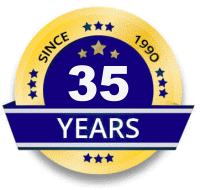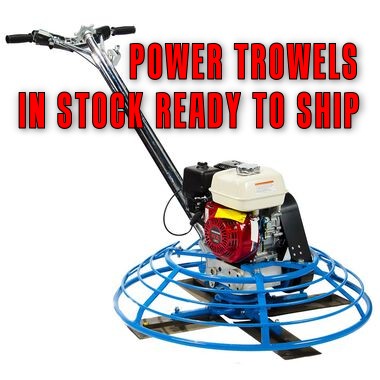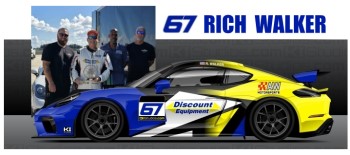Whiteman / Multiquip CA4HM Power Trowel, 24", 4 HP Honda, GX120, W/Handle
Safety Information
Multiquip Whiteman CA4HM Walk-Behind Trowel
SAFETY INFORMATION
Caution
DO NOT operate this equipment without proper protective clothing, shatterproof glasses, respiratory protection, hearing protection, steel-toed boots and other protective devices required by the job or city and state regulations.
Avoid wearing jewelry or loose-fitting clothes that may snag on the controls or moving parts as this can cause serious injury.
DO NOT operate this equipment when not feeling well due to fatigue, illness, or when on medication.
DO NOT operate this equipment under the influence of drugs or alcohol
ALWAYS clear the work area of any debris, tools, etc. that would constitute a hazard while the equipment is in operation.
NO ONE other than the operator is to be in the working area while the equipment is in operation.
NEVER use the equipment for any purpose other than its intended purposes or applications.
NOTICE
This equipment should only be operated by trained and qualified personnel 18 years of age and older.
Replace nameplate, operation and safety decals whenever they become difficult to read.
Manufacturer does not assume responsibility for any accident due to equipment modifications. Unauthorized equipment modification will void all warranties.
DO NOT use accessories or attachments that are not recommended by Multiquip for this equipment. Damage to the equipment and/or injury to the user may result.
ALWAYS know the location of the nearest fire extinguisher.
ALWAYS know the location of the nearest first aid kit.
ALWAYS know the location of the nearest phone or keep a phone on the job site. Also, know the phone numbers of the nearest ambulance, doctor and fire department. This information will be invaluable in the case of an emergency.
TROWEL SAFETY
DANGER
Engine fuel exhaust gases contain poisonous carbon monoxide. This gas is colorless and odorless, and can cause death if inhaled.
The engine of this equipment requires an adequate free flow of cooling air. NEVER operate this equipment in any enclosed or narrow area where the free flow of air is restricted. If the air flow is restricted it will cause injury to people and property and serious damage to the equipment or engine
NEVER operate the equipment in an explosive atmosphere or near combustible materials. An explosion or fire could result causing severe bodily harm or even death.
WARNING
ALWAYS keep clear of rotating or moving parts while operating the trowel.
DO NOT start or operate the trowel if the drive train will not disengage. Centrifugal force between the trowel and surface when starting can cause uncontrolled handle movement that can cause serious injury. The handle must not move while pulling the engine recoil starter.
NEVER disconnect any emergency or safety devices. These devices are intended for operator safety. Disconnection of these devices can cause severe injury, bodily harm or even death. Disconnection of any of these devices will void all warranties.
CAUTION
DO NOT stand on the trowel during operation.
NEVER lubricate components or attempt service on a running machine.
DO NOT place your feet or hands inside the guard rings while starting or operating this equipment.
ALWAYS keep the work area clear around the trowel. Make sure it is free of debris and objects.
NOTICE
ALWAYS keep the trowel in proper running condition.
Fix damage to the trowel and replace any broken parts immediately.
ALWAYS store equipment properly when it is not being used. Equipment should be stored in a clean, dry location out of the reach of children and unauthorized personnel.
A safety manual for operating and maintenance personnel of concrete power trowels produced by the Association of Equipment Manufacturers (AEM) can be obtained for a fee by ordering through their website at www.aem.org. Order Form PT-160.
ENGINE SAFETY
WARNING
DO NOT place hands or fingers inside the engine compartment while the engine is running.
DO NOT operate the engine with heat shields or guards removed.
Keep fingers, hands, hair and clothing away from all moving parts to prevent injury.
DO NOT remove the engine oil drain plug while the engine is hot. Allow the oil to cool before performing maintenance. This will prevent scalding of personnel.
CAUTION
NEVER touch the hot exhaust manifold, muffler, or cylinder. Allow these parts to cool before servicing the equipment.
NOTIO9N
DO NOT run the engine without an air filter or with a dirty air filter. Severe engine damage may occur. Service the air filter frequently to prevent engine malfunction.
NEVER tamper with the factory settings of the engine or engine governor. Damage to the engine or equipment can result if operating in speed ranges above the maximum allowable
FUEL SAFETY
DANGER
DO NOT add fuel to the equipment if it is placed inside a truck bed with a plastic liner. The possibility exists of explosion or fi re due to static electricity.
DO NOT start the engine near spilled fuel or combustible fluids. Fuel is extremely flammable and its vapors can cause an explosion if ignited.
ALWAYS refuel in a well-ventilated area, away from sparks and open flames.
ALWAYS use extreme caution when working with flammable liquids.
DO NOT fill the fuel tank while the engine is running or hot.
NEVER overfill the fuel tank. Spilled fuel can ignite if it comes into contact with hot engine parts or sparks from the ignition system.
Store fuel in appropriate containers, in well-ventilated areas, away from sparks and flames.
NEVER use fuel as a cleaning agent.
NEVER smoke around or near the equipment. Fire or explosion could result
from fuel vapors or if fuel is spilled on a hot engine.
TRANSPORTING SAFETY
WARMING
DO NOT allow any person or animal to stand underneath the equipment while it is being lifted.
NOTION
Some walk-behind trowels can be lifted or moved by two people utilizing lifting tubes or other special attachments. Generally, however, they must be lifted using lifting bails and cranes, hoists, or forklifts.
DO NOT transport the trowel with float pans attached unless safety catches are used and are specifically cleared for such transport by the manufacturer.
DO NOT hoist the trowel more than three feet off the ground with float pans attached.
ALWAYS make sure that the lifting bail is not damaged before lifting.
ALWAYS make sure the crane or lifting device has been properly secured to the lifting bail of the equipment.
ALWAYS shut down the engine before transporting.
DO NOT lift the equipment while the engine is running.
Tighten the fuel tank cap securely and close the fuel cock to prevent fuel from spilling during transport.
Use adequate lifting cable (wire or rope) of sufficient strength.
NEVER lift the machine to unnecessary heights.
ALWAYS tie down the equipment securely with rope during transport.
ENVIRONMENTAL SAFETY/DECOMMISSIONING
NOTION
Decommissioning is a controlled process used to safely retire a piece of equipment that is no longer serviceable. If the equipment poses an unacceptable and unrepairable safety risk due to wear or damage or is no longer cost effective to maintain (beyond life-cycle reliability) and is to be decommissioned (demolition and dismantlement), be sure to follow the rules below.
DO NOT pour waste or oil directly onto the ground, down a drain or into any water source.
Contact your country’s Department of Public Works or the recycling agency in
your area and arrange for proper disposal of any electrical components, waste, or oil associated with this equipment.
When the life cycle of this equipment is over, remove the battery and bring it to an appropriate facility for lead reclamation. Use safety precautions when handling batteries that contain sulfuric acid.
When the life cycle of this equipment is over, it is recommended that the trowel frame and all other metal parts be sent to a recycling center.
Metal recycling involves the collection of metal from discarded products and its transformation into raw materials to use in manufacturing a new product.
Recyclers and manufacturers alike promote the process of recycling metal. Using a metal recycling center promotes energy cost savings.
EMISSIONS INFORMATION
NOTICE
The gasoline engine used in this equipment has been designed to reduce harmful levels of carbon monoxide (CO), hydrocarbons (HC), and nitrogen oxides (NOx) contained in gasoline exhaust emissions.
This engine has been certified to meet US EPA evaporative emissions requirements in the installed configuration.
Attempts to modify or make adjustments to the engine emission system by unauthorized personnel without proper training could damage the equipment or create an unsafe condition.
Additionally, modifying the fuel system may adversely affect evaporative emissions, resulting in fines or other penalties.
Emission Control Label
The emission control label is an integral part of the emission system and is strictly regulated.
The label must remain with the engine for its entire life.
If a replacement emission label is needed, please contact your authorized engine distributor. | 










